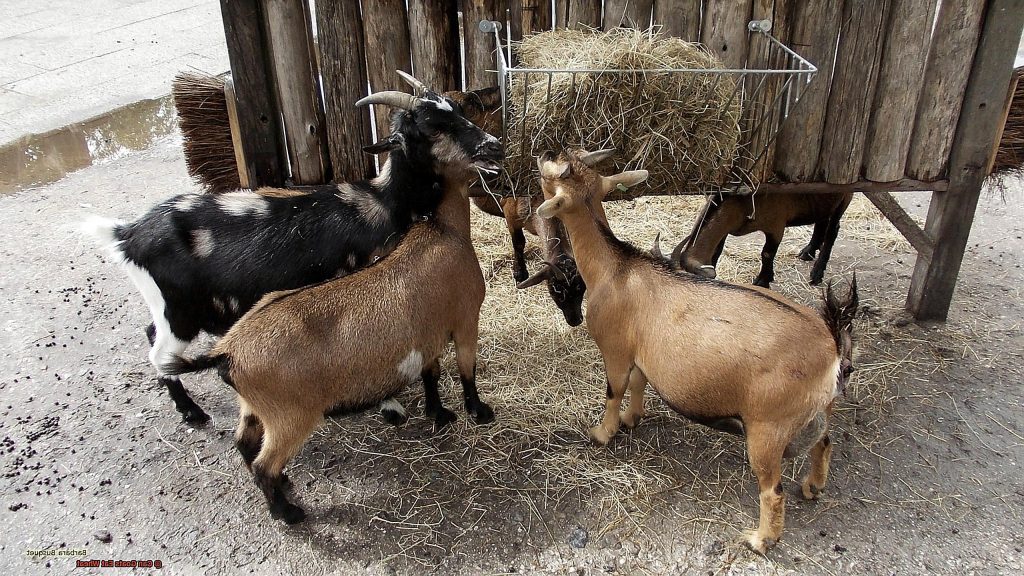Are you a goat owner or planning to get one?
Are you looking for ways to keep your furry friends healthy and happy? Perhaps you’ve been considering adding wheat to their diet.
As an expert in all things goat-related, I’m here to give you the lowdown on whether goats can eat wheat and what it means for their wellbeing. Goats may have a reputation for being adventurous eaters, but they require a balanced diet that includes carbohydrates, fiber, minerals, and vitamins.
Wheat is a popular grain with numerous uses worldwide. But is it safe for goats?
The answer is yes. Goats can consume wheat without any issues, and it provides several nutritional benefits such as easily digestible carbohydrates, magnesium-rich minerals, and B-complex vitamins.
However, too much of anything can be harmful – feeding your goats excessive amounts of wheat can lead to health complications like obesity, stomach bloat, and diarrhea. It’s crucial to ensure that wheat is part of a well-rounded diet for your goats and that they consume it in moderation.
In this blog post, we’ll explore the nutritional advantages and risks associated with feeding your goats wheat. We’ll also discuss how much wheat should be included in their diet and other important factors to consider.
In this post, you’ll have all the information you need to make informed decisions about incorporating wheat into your goat’s diet while keeping them healthy and happy.
How Much Wheat Can Goats Eat?
Contents
While goats can safely eat wheat, it’s important to understand that moderation is key.
Feeding them too much wheat can result in health issues like bloating and diarrhea. To determine the appropriate amount of wheat for your goats, you need to consider their age, breed, and overall health.
As a general rule of thumb, grains like wheat should not exceed 10-15% of their daily diet. For instance, if your goat eats 3-4 pounds of feed per day, only 0.3-0.6 pounds should be wheat.
It’s also essential to note that wheat should not be the primary source of nutrition for goats since it’s high in carbohydrates and low in protein. Instead, it should supplement their diet as a treat or snack.
When feeding your goats wheat, ensure that it’s clean and free from mold or other contaminants. Moldy or spoiled wheat can cause health issues for your goats and should be disposed of immediately.
Always monitor their intake and make adjustments according to their individual needs.
Health Concerns of Feeding Goats Too Much Wheat
While it may seem like a harmless treat, overindulging your goats in wheat can lead to serious problems that threaten their overall health and well-being.
Firstly, goats require a balanced diet that includes roughage, protein, and minerals. Unfortunately, wheat lacks essential nutrients, making it an inadequate primary source of food for goats.
Feeding goats too much wheat can result in poor digestion and nutrient absorption due to the lack of roughage in their diet.
Moreover, one of the most significant health concerns of feeding goats too much wheat is the risk of digestive problems.
Wheat is high in starch, which can ferment in the rumen and result in bloating, diarrhea, and acidosis. These conditions can be fatal if left untreated, making it crucial to monitor the amount of wheat given to your goats.
In addition to digestive problems, feeding goats too much wheat can lead to obesity and other weight-related issues. Wheat is high in carbohydrates and low in fiber, resulting in excessive weight gain and a higher risk of metabolic disorders such as diabetes.
To prevent these health concerns, it’s important to prioritize a balanced diet that includes roughage, protein, and minerals for your goats. While they may enjoy the taste of wheat, it should only be given to them in moderation as a treat rather than a primary food source.
By prioritizing a balanced diet that includes roughage, protein, and minerals and monitoring the amount of wheat given to your goats, you can prevent digestive problems and maintain a healthy weight for your beloved animals.
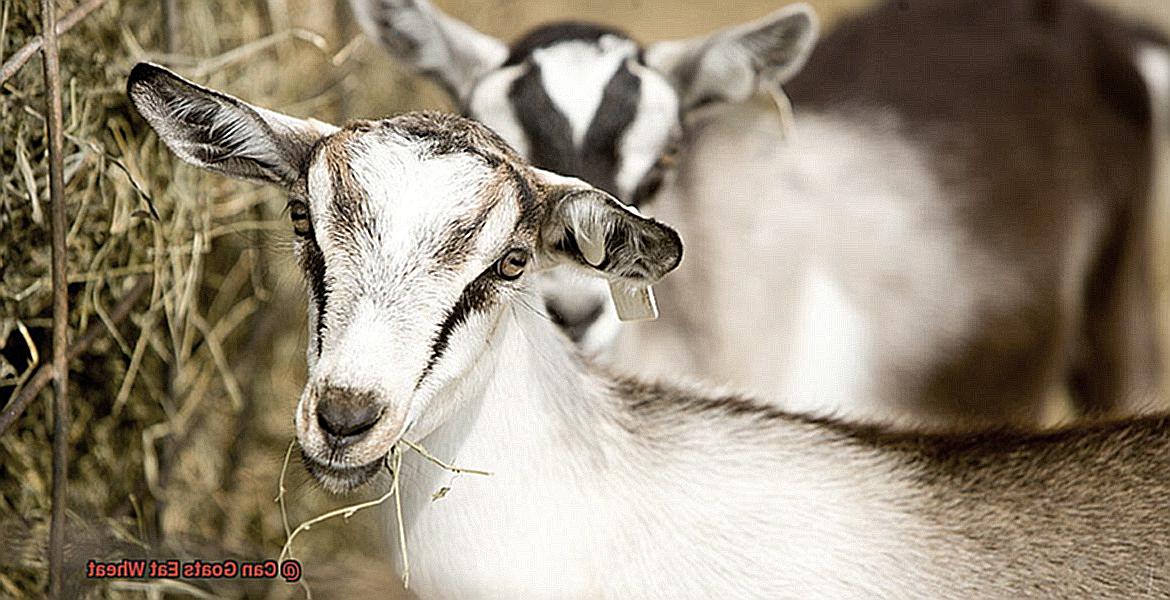
Signs of Bloat in Goats
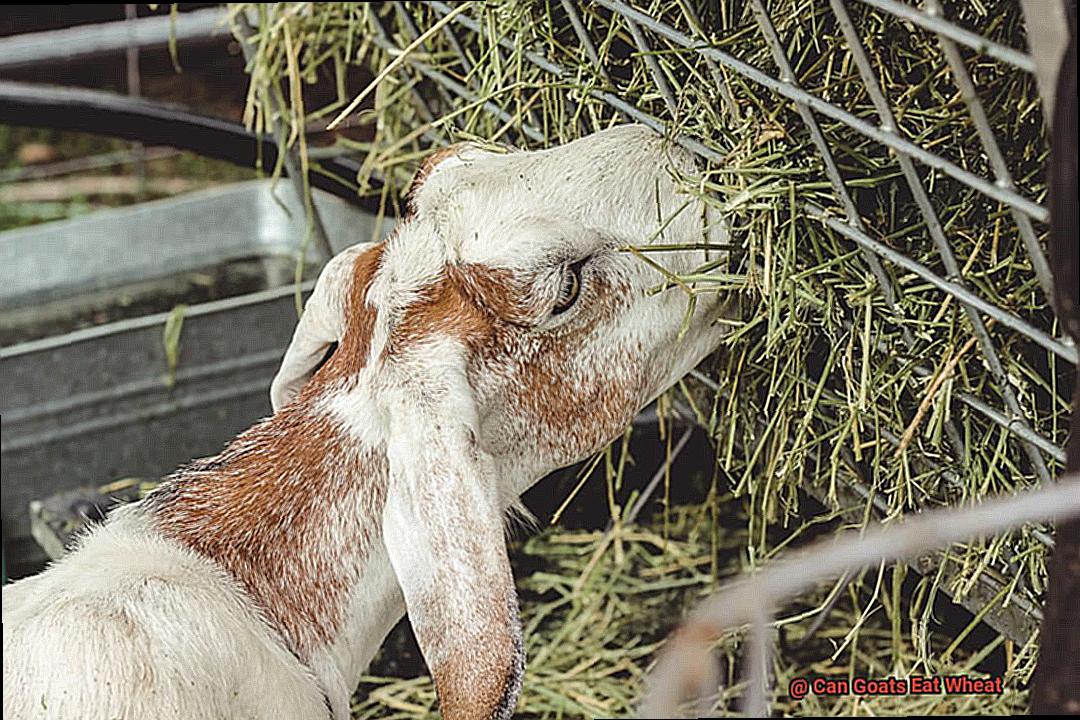
Bloat is a serious condition that can occur when goats consume too much grain or food too quickly.
The symptoms of bloat include a swollen abdomen, difficulty breathing, restless behavior, and loss of appetite or thirst. In addition to physical symptoms, goats with bloat may show behavioral changes like lethargy or depression.
It is essential to recognize these signs and take immediate action to prevent further complications. If left untreated, bloat can lead to dehydration, shock, and even death.
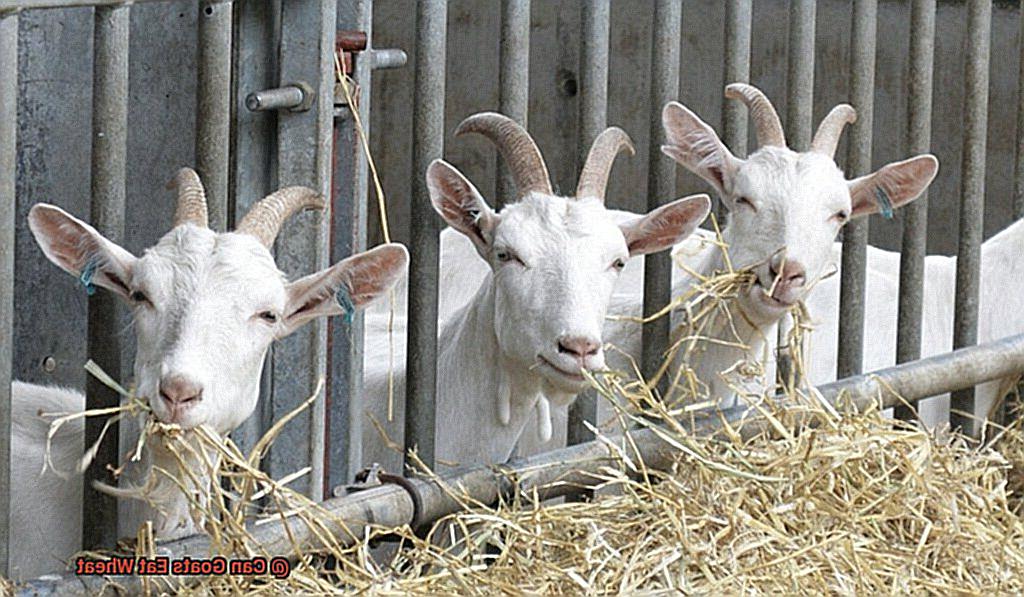
Preventing bloat starts with monitoring your goats’ diet and ensuring they have access to plenty of fresh water at all times. A balanced diet that includes roughage, protein, and minerals will help keep your goats healthy and limit their intake of treats like wheat or other grains.
Digestive Issues Caused by Eating Too Much Wheat
While goats can eat wheat, overconsumption can lead to digestive issues that can cause discomfort and potentially serious health problems.
One of the primary concerns with goats consuming too much wheat is bloat. This condition occurs when the goat’s stomach fills with gas, leading to discomfort and in some cases, more severe health complications.
Wheat is particularly problematic because it’s high in soluble carbohydrates, which can be challenging for goats to digest. In addition to bloat, consuming excessive amounts of wheat can also cause digestive upset such as diarrhea and constipation.
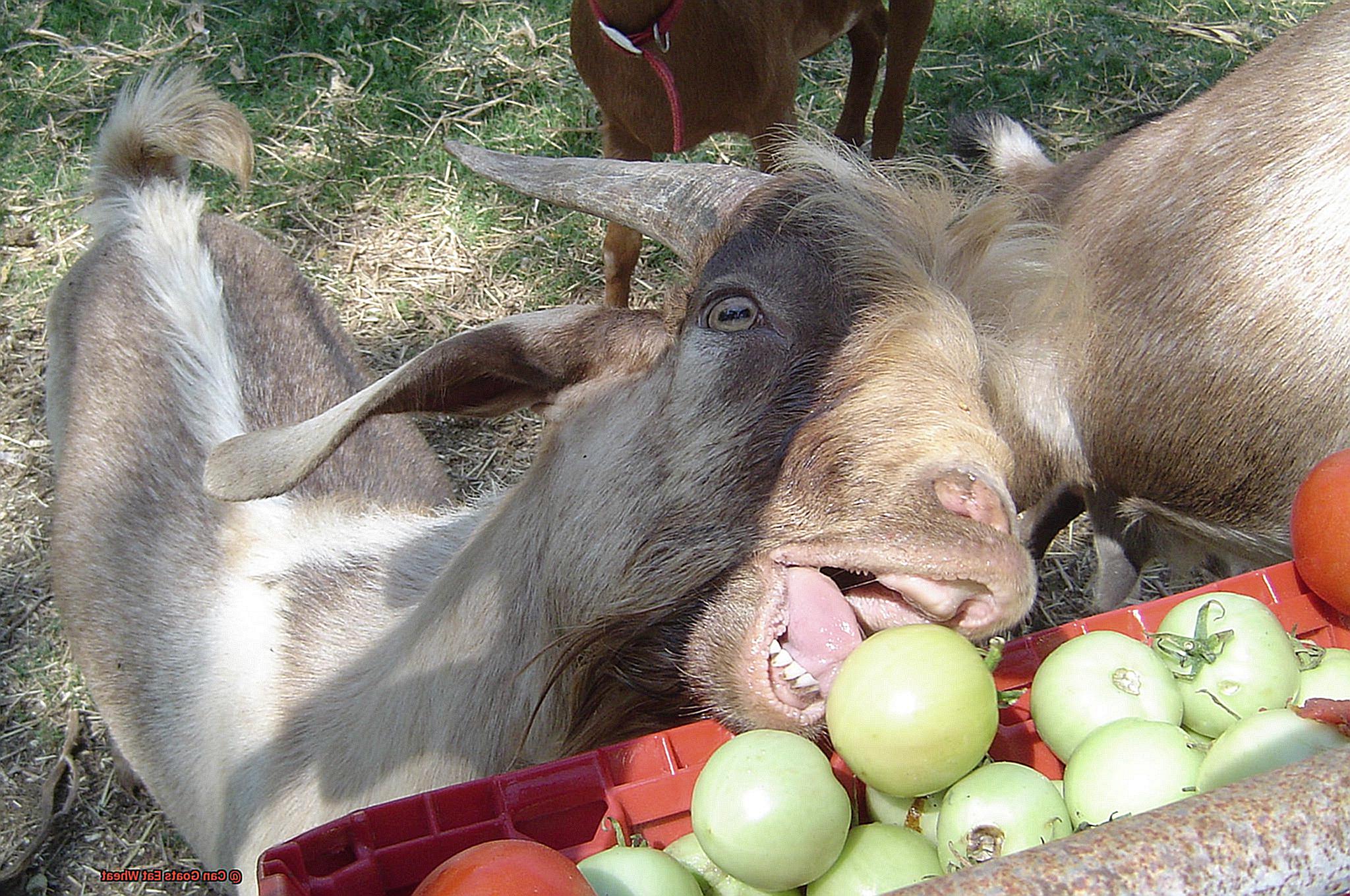
These issues can make your goat uncomfortable and may require veterinary attention if the symptoms persist. To prevent these digestive issues from occurring, it’s crucial to keep an eye on your goats’ wheat intake and provide them with access to plenty of fresh water and roughage.
A balanced diet that includes protein and minerals is also crucial for their overall health. In conclusion, while goats can eat wheat, it’s vital to monitor their consumption levels and be aware of the potential digestive issues that could arise.
Remember, if you suspect your goat may have bloat or any other digestive issue, seek veterinary care immediately.
Toxicosis: The Dangers of Moldy or Spoiled Wheat
Toxicosis is a condition that can occur when goats consume mycotoxins, which are produced by fungi that grow on moldy wheat.
These toxins can lead to a range of health issues, from decreased appetite and weight loss to liver damage and even death. To prevent toxicosis, it is vital to properly store and handle your goat’s feed.
Wheat should be kept in a dry, cool place with good ventilation to prevent moisture and mold growth. Additionally, it is recommended that you purchase fresh, high-quality wheat from a reputable source to ensure that it is free from contaminants and mold.
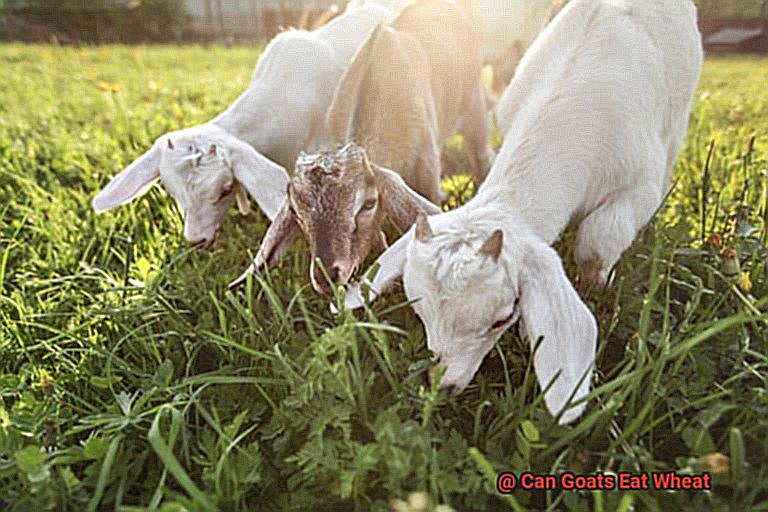
If you do come across moldy wheat, it is best to discard it rather than risk exposing your goats to potential health hazards. While not all moldy wheat contains mycotoxins, it is always better to err on the side of caution.
After all, your goats’ health and well-being are too important to take chances with. In summary, while goats can eat wheat as part of their diet, it is essential to be cautious about feeding them moldy or spoiled wheat.
By properly storing and handling your goat’s feed and purchasing high-quality wheat from a reputable source, you can help ensure the health and well-being of your goats. If you suspect that your goats have been exposed to mycotoxins, seek veterinary care immediately.
Remember, prevention is always better than cure when it comes to toxicosis. Don’t let toxicosis compromise your goats’ health.
Take the necessary precautions and safeguard their well-being by being mindful of the quality of their feed.
Tips to Feed Goats Safely with Wheat
Feeding your goats with wheat can be a great way to provide them with essential nutrients. However, it’s important to keep in mind that there are some precautions you need to take to ensure their safety and health. Here are my top 5 tips for feeding goats safely with wheat.
Start Slowly
Introducing wheat into your goat’s diet requires patience. Start with small amounts and gradually increase it over time. This helps your goats’ digestive system adjust to the new food, preventing any digestive issues such as bloating or diarrhea.
Monitor Their Health
As you start feeding your goats wheat, keep an eye on their health. Pay attention to any signs of discomfort, such as bloating or constipation. If you notice any changes in their behavior, reduce the amount of wheat in their diet immediately.
Provide Plenty of Water
Goats need plenty of water to help move the food through their system and aid in digestion. Ensure that they have access to clean and fresh water at all times.
Use High-Quality Wheat
When feeding goats, it’s essential to use high-quality wheat free from mold or other contaminants that can be harmful to your goats. Goats are sensitive animals, and consuming contaminated wheat can lead to severe health problems.
Don’t Overfeed
While wheat can be a good source of nutrition for goats, it should not make up more than 10-15% of their diet. Overfeeding can lead to digestive issues and even death in extreme cases. Remember that a balanced diet is key to keeping your goats healthy and happy.
Bonus Tip: Supplement with Vitamins and Minerals
Wheat is not a complete source of nutrition for goats, so it’s important to supplement their diet with vitamins and minerals. This ensures that they are getting all the nutrients they need to stay healthy and happy.
So, feeding your goats with wheat can be beneficial if done correctly. By starting slowly, monitoring their health, providing them with plenty of water, using high-quality wheat, and avoiding overfeeding, you can keep your goats safe and healthy.
48JiWhTQPe0″ >
Conclusion
In conclusion, goats can safely eat wheat as part of a balanced diet.
However, moderation is key to prevent health complications such as obesity, stomach bloat, and diarrhea. Wheat is an excellent source of easily digestible carbohydrates, magnesium-rich minerals, and B-complex vitamins that are beneficial for goats’ health.
However, feeding them excessive amounts can be harmful. To ensure your goats stay healthy and happy when consuming wheat, provide them with plenty of fresh water and roughage.
A balanced diet with protein and minerals is also crucial for their overall well-being. When feeding your furry friends wheat, always check for mold or other contaminants that can be toxic to their health.
Moldy or spoiled wheat can cause a range of health issues such as decreased appetite, weight loss, liver damage, and even death. To feed your goats safely with wheat, start slowly and monitor their health closely.
Remember that prevention is always better than cure when it comes to your goat’s health.

